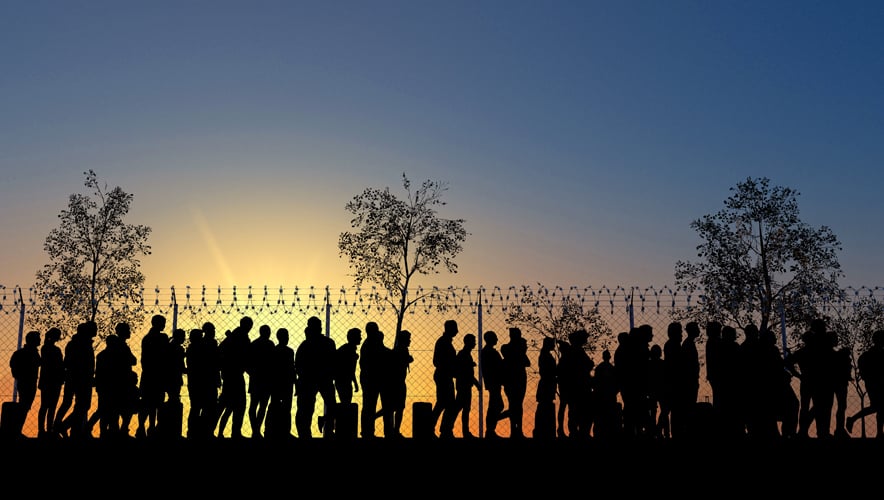Ukrainian Refugee Crisis Raises Human Trafficking Concerns
More than 3 million refugees have fled Ukraine since 24 February, according to the United Nations. Nearly 2 million of those refugees have entered Poland, followed by Romania, the Republic of Moldova, and Hungary.
In a country of 44 million, at least 1.85 million are now displaced internally within Ukraine, and 12.65 million are directly affected by the conflict, the UN Refugee Agency said.
“The escalation of conflict in Ukraine has caused destruction of civilian infrastructure and civilian casualties and has forced people to flee their homes seeking safety, protection, and assistance,” according to the UN. “In the first week, more than a million refugees from Ukraine crossed borders into neighboring countries, and many more are on the move both inside and outside the country. They are in need of protection and support. As the situation continues to unfold, an estimated 4 million people may flee Ukraine.”
Governments and watchdogs have warned, however, that criminal elements may be on the lookout for refugees to exploit.
“The risk of human trafficking in Eastern Europe was growing even before the Ukraine conflict. Now that risk is even larger”
— InterAction (@InterActionOrg) March 15, 2022
Human trafficking of Ukrainian women has emerged to be a dangerous by-product of the country’s refugee crisis. Via @WorldVision. https://t.co/jYIfoPFEXX
“The deteriorating humanitarian situation and resulting large scale and complex movements correlate with an increase in threat to personal safety, putting people on the move at heightened risk of exploitation,” according to the International Organization for Migration. “While cases of human trafficking are less likely to be identified in the immediate aftermath of mass displacement, initial reports from within and outside of Ukraine indicate the potential for traffickers to exploit the vulnerabilities of those fleeing the war.”
Human trafficking during mass migration or refugee movements is far from uncommon. A UN survey in 2016 found that 70 percent of migrants arriving in Europe by boat ended up trafficked or exploited. Half of the migrants surveyed said they had worked without pay, with many being threatened by an employer or labor broker.
Conflict-driven displacement can increase the risk of trafficking, according to the Council on Foreign Relations, and more than 70 percent of detected trafficking victims are female.
The overall message to Ukrainian refugees is currently “welcome.” In the United Kingdom, the government has set up a website where anyone can apply to host refugees in their own homes or another property for at least six months. Almost 90,000 people signed up to host within the first day, the BBC reported. The risk of trafficking remains, however, and governments are trying to increase awareness about the threat.
Women and children fleeing Ukraine are at an increased risk of gender-based violence, including trafficking and sexual exploitation & abuse.@antonioguterres pic.twitter.com/m9USWLaZLN
— UNHCR, the UN Refugee Agency (@Refugees) March 16, 2022
The city of Berlin warned Ukrainian refugees not to accept offers of money or accommodation when they arrive at the train station due to concerns that they might be lured into human trafficking schemes, according to Reuters. While there was no concrete evidence of this activity so far in Germany, police left signs in German, Ukrainian, and Russian at the train station warning against accepting suspicious offers of help.
Last week, 300,000 private homes in Germany were offered up to house refugees. Authorities now advise that people wanting to share their homes register on coordinated websites instead of approaching refugees when they arrive.
In Poland, police detained a man suspected of raping a 19-year-old refugee he lured with offers of shelter. Police also questioned another man who was offering to help only women and children, raising suspicions, the Associated Press reported.
“You have to worry about any potential risks for trafficking—but also exploitation, and sexual exploitation and abuse,” said Joung-ah Ghedini-Williams, head of global communications for the UN High Commissioner for Refugees, in an interview with the Associated Press. “These are the kinds of situations that people like traffickers… look to take advantage of.”
Apart from sexual abuse, refugees are also at risk for labor exploitation. An offer to exchange safe lodging for labor—often cleaning or babysitting—could lead to labor trafficking, especially if people who accept those terms are then forced to remain in a position or work long-term for free, experts warn.
“Even before this conflict, areas of Eastern Europe had posed a high risk to vulnerable women of falling victim to human trafficking,” said Eleanor Monbiot OBE, World Vision Middle East and Eastern Europe regional leader. “But the Ukrainian conflict is causing many more women to become vulnerable to trafficking. Displacement, suddenly falling into extreme poverty, being widowed, losing, or being separated from family members and many other characteristics of this conflict, are creating countless more vulnerable women every hour.”
